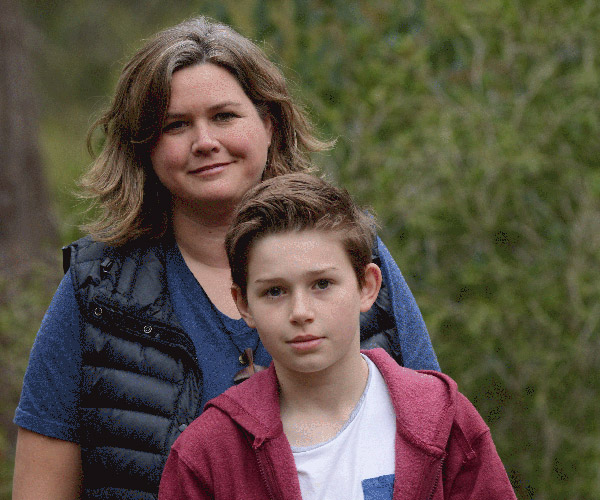Sera, 44, shares her true life story:
My son Jasper ran along the path in the bush.
“Look Mummy!” he said, pointing at some bugs.
We lived on a five-acre bushland property and my husband Dave and I often took Jasper, three, and our older son Leo, five, for bush walks.
Later, we got home and Jasper rolled around in the dirt outside our house.
Suddenly, he cried out in pain.
“Something bit me!” he said, showing me his right hand.
He started bawling his little eyes out.
I examined him and found a red spot on his index finger.
“I reckon it was one of those Jack Jumpers,” Dave said.
“A what?” I asked.
Dave explained they were venomous ants.
“They sting like bees,” he added.
Jasper was covered in dirt so I put him straight in the bath, but as I washed him, red blotches formed all over his body.
We quickly took him to our closest medical clinic and the doctor explained it was anaphylaxis – a severe allergic reaction to the ant’s poison.
Back home, we hoped it was a one-off but two weeks later the kids were playing outside when Jasper screamed out in pain again.

Jasper and Dave on a bushwalk.
This time, an ant had stung him on his foot.
At hospital he was treated with steroids and antihistamines, but it took hours for the hives and swelling to go down.
Then the specialist said something that shocked me to my core, “Multiple bites could be fatal.”
Fatal? An ant could actually kill him?
It was the stuff of nightmares.
We were given an EpiPen containing adrenaline to inject into his thigh if it happened again.
Related video: TV producer brain damaged after allergic reaction to nuts
It was a horrible situation to be in.
We wanted Jasper to enjoy the outdoors, but at the same time we lived in terror of him suffering another bite.
What if it happened when one of us wasn’t around?
The thought made me shudder and I began to watch him like a hawk.
Thankfully he went for ages without another sting.
A year later, we were holidaying in Waratah Bay, Vic, and Jasper was rolling around in the grass, play wrestling with Dave when he suddenly yelped in pain.

Jasper needs to have his EpiPen with him at all times.
This time the Jack Jumpers had stung his chest twice.
He immediately broke out in hives and started wheezing.
His airways were closing.
Dave scooped him up and we raced back to our cabin.
Jasper’s faced started swelling up.
I grabbed his EpiPen and jabbed his thigh.
My heart pounded as I waited for his breathing to improve.
Thankfully the puffiness started to go down and he stopped gasping for breath.
I was panic stricken.

Jasper bring treated.
“We could’ve lost him,” I said to Dave when we finally got home.
I didn’t want to stop him playing outside for his whole childhood.
But his reactions were worse every time.
The next one could easily kill him.
I discovered there was a clinic in Hobart offering lifesaving treatment to desensitise people allergic to the ants, but there was no such treatment available in Melbourne.
I met a lady named Michelle, whose son Ryan, five, had the same allergy.
We decided to join forces to campaign for a Melbourne treatment facility.
Over 500 people who also needed treatment joined our campaign.
After five years, the Health minister finally approved a Melbourne program, and the Jack Jumper Ant Clinic opened in Clayton, Vic.
Jasper will soon start regular injections of Jack Jumper ant venom to desensitise him to it.
The treatment takes five years, but it’ll be worth it if it saves his life.
All little boys kids should be able to explore the great outdoors without fear.
Who would’ve thought something so tiny could have such a massive impact on our lives.


